Oslo Accord was a direct blow to the Palestinian cause by giving up historic Palestine and Palestinian refugees’ rights to return and self-determination. This prompted the Palestinian refugees to insist on their cause and legitimate rights.
Moreover, after Oslo Accord, the collapse of the Palestine Liberation Organization’s foundations and the decline of national action parties’ influence enhanced the feeling of alienation and lack of horizon among the Palestinians.
As a response, the people of the camps engaged in creating demand movements and public frameworks, especially the right of return committees and other popular organizations and initiatives, one of which was the Jafra Foundation. Adopting the framing of the Palestinian youth work, Jafra focused on working in the Palestinian camps and among Palestinian refugees, aiming to empower the youth, exchange experiences among them, and promote, within the refugee camps and gatherings, the Palestinian national identity and steadfastness mechanisms.
In 2000, the second Palestinian uprising significantly influenced the restoration of Palestinian refugees’ hope of achieving their legitimate rights.
Within these circumstances, Jafra was founded by a group of Palestinian youth, from different political backgrounds, under the framework of Palestinian youth work that is committed to empowering Palestinian refugee youth and maintaining their national identity. In 2002, the Foundation started in the Yarmouk camp -the Palestinian diaspora capital- located in Damascus, under the name of “Jafra Youth Center”.
Focusing on programs directed at youth and children, the Foundation’s activities from 2002 to 2011 in Syria pointed at empowering and training the Palestinian camp youth aside from building their skills and experiences so that they become the Palestinian refugee’s voice, face the Palestinian cause elimination efforts, enhance their steadfastness, and activate their participation in their camps. To achieve this, a variety of cultural and artistic programs, national events, training courses designated to develop leadership skills among the youth, educational activities, computer and English courses, and camps for youth and children are annually held.
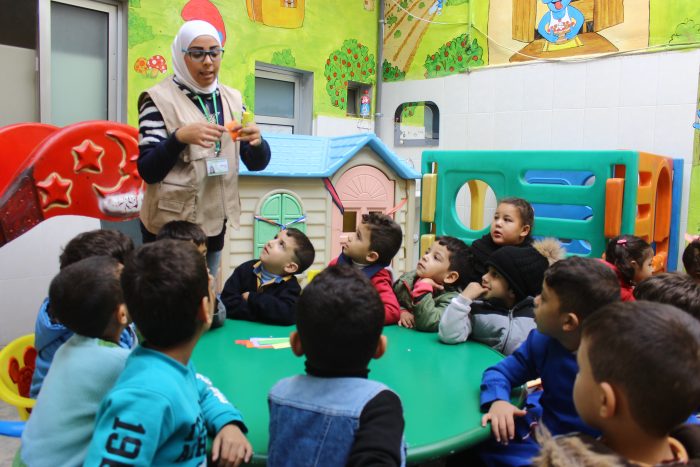
Besides hosting many delegations and participants who are in solidarity with the Palestinian cause and refugees across the globe, the foundation participated in many youth camps in several Arab and European countries, exchanging skills and experiences among Palestinian camps, promoting Palestinian cause supporting campaigns, introducing the Palestinian refugees’ issue, and encountering elimination projects.
Until the Syrian Crisis in 2011, the Jafra Foundation continued its social, cultural, and youth programs.
After what, due to insecurity and the violence rate increase, waves of displaced people began arriving at the Yarmouk camp in search of shelter and safety. Until the 16th of December 2012, 120 thousand displaced people resided in shelter centers, formerly school buildings, and rented apartments in Yarmouk camp. Most of them were Eastern Ghouta, Qaboun, Homs, Al Hajar Al Aswad, and Al Tadamon residents.
Based on the emerging needs, Jafra modified its programs and policies, focusing on humanitarian and relief work such as waste and water management, sanitation, and food basket distribution.
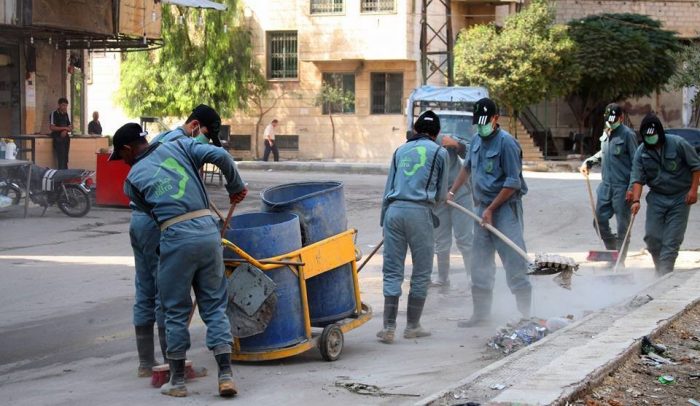
Both the Syrian Crisis intensifying and the displacement of the Yarmouk camp people have increased the humanitarian needs and stopped some basic services such as waste collection, education, and water distribution in the camps. However, the Foundation established work teams in camps and other Palestinian communities and expanded the framework to include emergency and humanitarian programs alongside educational and youth activities. Also, it focused on finding alternative and sustainable solutions such as agriculture, waste recycling and education in emergency while continuing social and development activities and developing livelihoods.
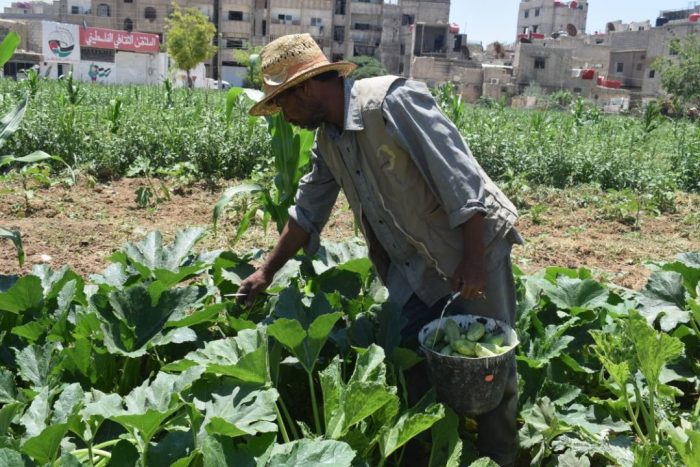
From 2012 to 2022, the Foundation organized these programs in Qudsaya and its suburb, Jaramana camp, Khan Eshieh camp, Yarmouk camp, Homs camp, and southern Damascus (Yelda – Babila – Beit Sahem) to which Yarmouk camp refugees moved in 2015 after ISIS entry to the camp. Also, in Husseiniya, Sahnaya, Barzeh, and other regions, relief/humanitarian campaigns, training courses, or educational activities have been seasonally held.
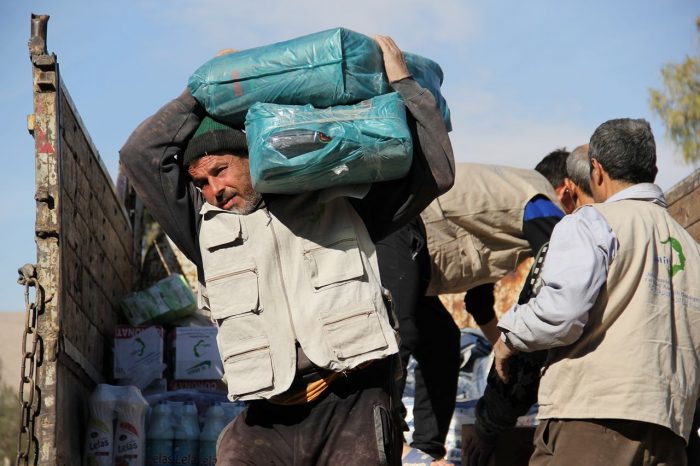
The Foundation worked on the principle of comprehensiveness of work due to the multiplicity of needs and the magnitude of the disaster the Palestinian refugees are going through inside and outside the Palestinian camps. This was caused by the intensification of the battles and the involvement of some camps in the direct military action phase, such as Daraa, Muzayrib, Al Sbeina, Yarmouk, Khan Eshieh and Handarat camps as well as Husseiniya gathering. Additionally, Yarmouk camp refugees found themselves caught up once again in Qudsaya’s ongoing conflict following their displacement.
In all regions, the work basis was to protect Palestinian camps and civilians, particularly children, and follow up the children’s educational process in cooperation with local organizations and educational institutions.
Thus, in the most difficult circumstances, the Foundation continued providing refugees with alternative education services, attempting to prevent children from losing their school years or their opportunity to learn and to overcome the difficult circumstances by providing safe and friendly places for children.
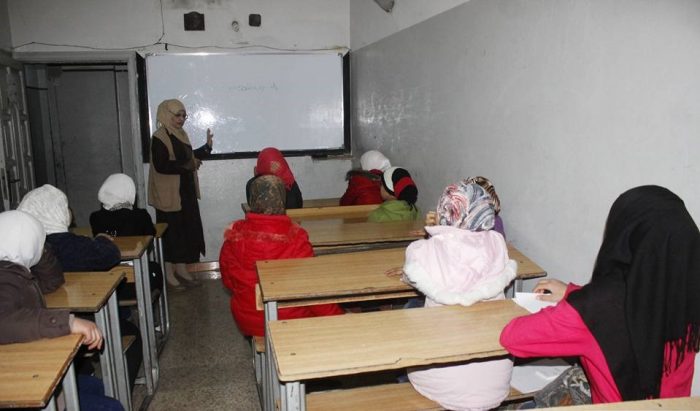
Here, we must extend our thanks and highest appreciation to the alternative institutions and schools that were formed, especially in the Yarmouk camp and the southern region; this includes Al-Jarmaq alternative school, which did a tremendous job on the educational level for the ones who remained in Yarmouk camp. Also, we thank the volunteers from the educational and administrative staff who continued working day and night, trying to save the education process, help students enroll in official government exams, and ensure duly recognized results and certificates.
Furthermore, a great staff of teachers and administrators was active, especially in Khan El-Shiekh camp, Qudsaya, Jaramana camp, and Homs, leaving a positive impact in terms of providing preparatory and secondary certificates education services. In this field, being the head of this staff, many well-known teachers were devoted to educating children and youth and enabling them to pass the preparatory and secondary exams.
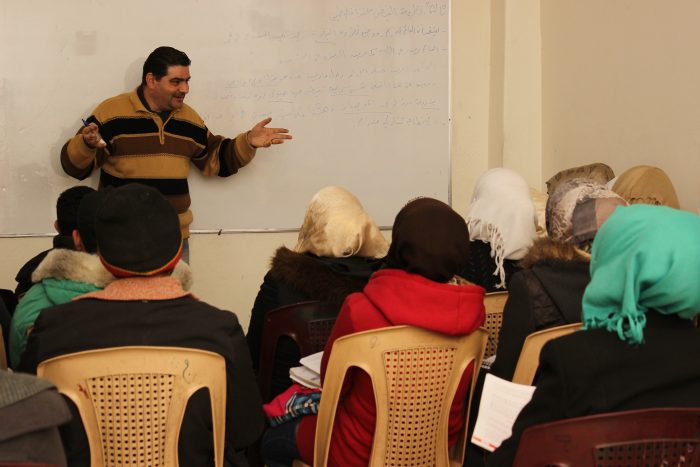
The Foundation added the relief and humanitarian work item and gave priority to working in the most hard-to-reach areas such as Yarmouk and Khan Eshieh camps where municipal services were suspended and basic services were disrupted such as water, electricity, health, and cleaning. Neighborhoods became threatened by the spread of diseases and the worsening of the situation if garbage spread and accumulated along with the water and electricity cuts in the area.
Naturally, the departure of any area from the control of the state would automatically suspend municipal and UNRWA services in that area, contributing to an increase in needs and a decrease or complete interruption in services. In addition, the work of all UNRWA educational, health, and service facilities inside the camp has been suspended for security reasons after the state lost control over these areas. Also, the departure of any area from the regime’s control could result in its complete siege or isolation (as is the case with the Yarmouk camp, which was subjected in the period from 12-16-2012 until June 2018 to a partial followed by a complete siege) and then to a limited closure until the government forces regain control over it. Moreover, the entry of food and health supplies to Khan Eshieh camp and other besieged places at that time was hindered by imposed measures. Also, during the first years of the war, military actions hindered the entry of food into Qudsaya town more than once.
From this point on, Jafra’s work in the camps began to take on a humanitarian character more or less to include the distribution of food and hygiene aid, heating fuel, drinking water, waste management and sanitation after water cuts. Over the past years, Jafra has secured these services in Yarmouk camp, Khan Esheih camp and southern Damascus, until the local municipalities return to provide basic services after regaining control of them by government forces and the return of UNRWA services.
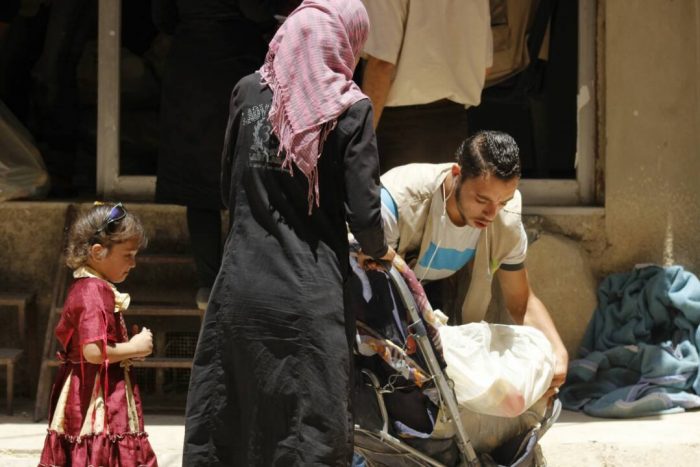
The Foundation’s staff, in cooperation with international partner organizations, had to work quickly to build the capacity of its working team, as courses were held in project management, organization management, International Humanitarian Law, protection and safety, financial and logistics management, risk analysis, development of internal policies, the structure of the Foundation, in order to expand and develop work while preserving the privacy of the areas, camps and prevailing conditions. Jafra has benefited from the local expertise available in Syria and worked to embrace and develop them to suit the requirements of humanitarian work in emergency. Contingency plans and plan Bs were also developed, which helped in continuity of work and the ability to plan in advance and anticipate what might happen and what should be done in different scenarios.
In its work, the Foundation focused on the need to continue in all the affected areas, especially those where UNRWA services were suspended because they are hard-to-reach areas. It also worked to strengthen communication between these camps and open channels of dialogue based on the interests of refugees and civilians. As a result, the Foundation was subjected to great pressures, sometimes reaching kidnappings, arrests and physical liquidation. However, the Foundation and its team maintained its insistence on siding with the camps and civilians and their interests, while calling for a cessation of violence and the neutralization of refugees.
The delegation of the Reconciliation Committee in the Qudsaya region was also received in Jafra’s office due to the positive and neutral role played by the Foundation in all its areas of operation.
In Yarmouk camp, the Foundation’s team has undergone many changes due to repeated displacement, but on the other hand, this led to the arrival of Jafra volunteers in Yarmouk to all the camps as they joined the teams working there. Where they formed the core of relief work in Qudsaya and Qudsiya suburb and the cadre of the main office of the administration in Damascus.
Jafra’s team on the Yarmouk camp was exposed during that period to many dangers and serious humanitarian challenges due to the hostilities and the lack of basic food and medical supplies, in addition to the difficulties faced by the education file, which prevented its continuity. Despite all this, Jafra continued to provide its services and did not stop for a single day from performing its duty to provide hygiene services, water, agriculture, education, activities for children and youth, in addition to food and hygiene baskets and the operational projects that were established in the camp to support and empower the most vulnerable households.
The Foundation in Yarmouk camp has established cooperation and coordination relations with many local humanitarian organizations and groups active in the area and has worked to promote the principle of participatory responsibility.
Jafra also made unremitting efforts during the siege of Yarmouk camp and Khan Eshieh camp in order to create safe humanitarian corridors to deliver relief materials to the besieged civilians. The Foundation obtained approval to enter foodstuffs immediately after allowing UNRWA to enter or deliver aid to Yarmouk.
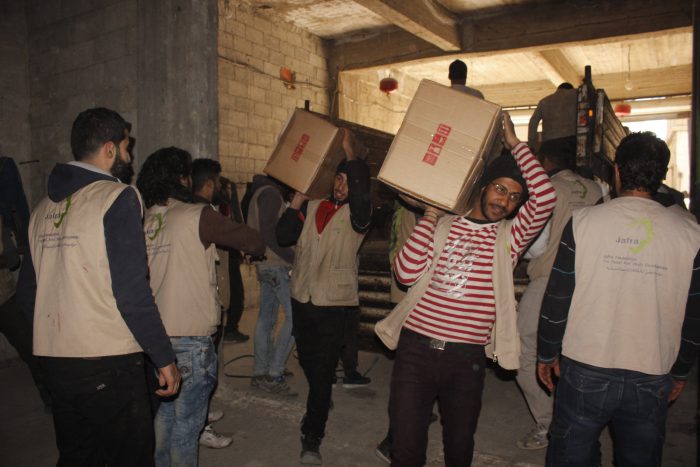
At that time, the working team in Damascus assumed the issue of coordination, management and logistical support for the Foundation and even the management of human resources, where the number of employees in Jafra, including administrative and educational cadres, volunteers and other working teams, reached about 600 male and female volunteers, and thus there was a lot of administrative, financial and logistical work and many risks which had to be avoided and neutralized. In addition to the need for skill and administrative, financial, logistical and even the process of monitoring, evaluation and follow-up with the partner organizations, the majority of which were international humanitarian organizations.
